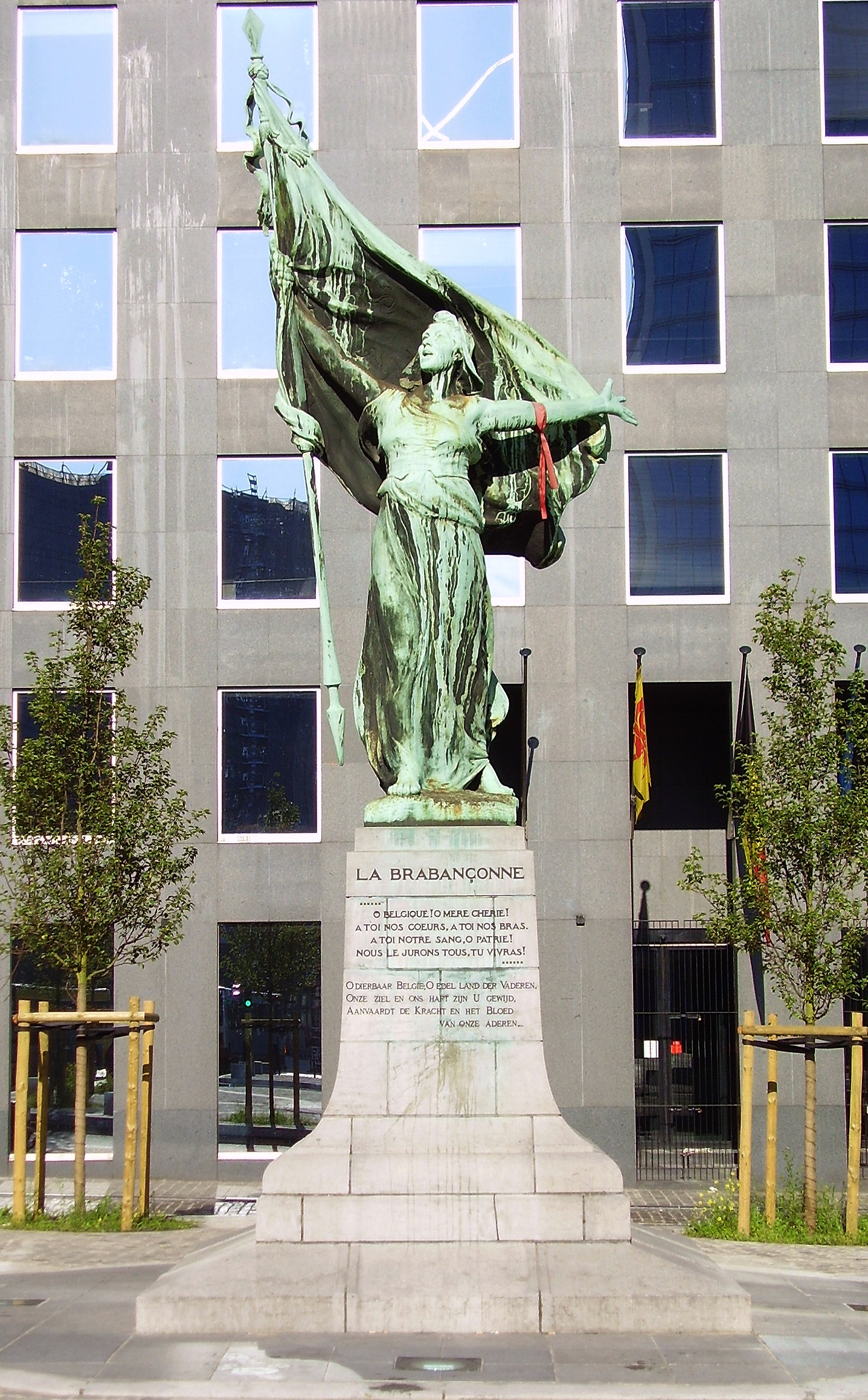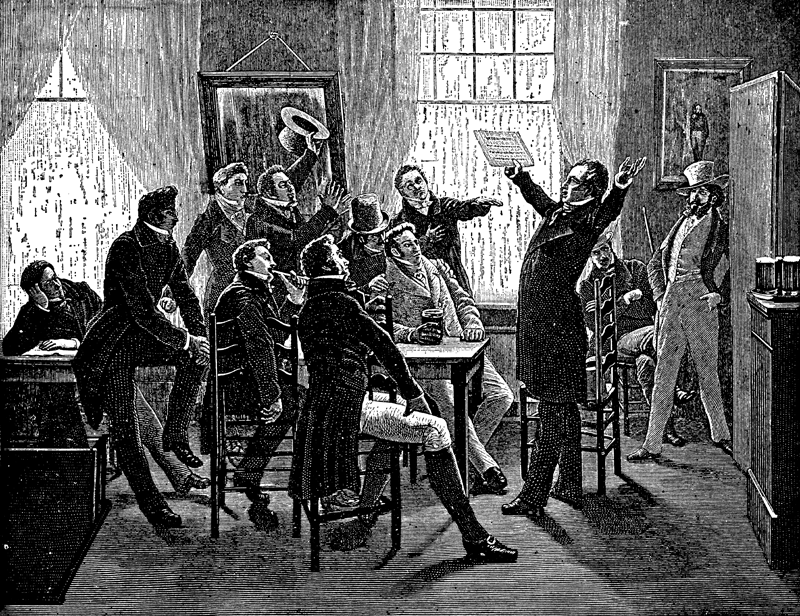La Brabançonne on:
[Wikipedia]
[Google]
[Amazon]
"" (; nl, "De Brabançonne"; german: "Das Lied von Brabant") is the
 According to legend, the Belgian national anthem was written in September 1830, during the Belgian Revolution, by a young revolutionary called "Jenneval", who read the lyrics during a meeting at the Aigle d'Or café.
Jenneval, a Frenchman whose real name was Alexandre Dechet (sometimes known as Louis-Alexandre Dechet), did in fact write the Brabançonne. At the time, he was an actor at the theatre where, in August 1830, the revolution started which led to independence from the Netherlands. Jenneval died in the war of independence. François van Campenhout composed the accompanying score, based on the tune of a French song called "L'Air des lanciers polonais" (" the tune of the Polish Lancers"), written by the French poet Eugène de Pradel, whose tune was itself an adaptation of the tune of a song, "L'Air du magistrat irréprochable", found in a popular collection of drinking songs called ''La Clé du caveau'' (The Key to the cellar) and it was first performed in September 1830.
In 1860, Belgium formally adopted the song and music as its national anthem, although the then prime minister,
According to legend, the Belgian national anthem was written in September 1830, during the Belgian Revolution, by a young revolutionary called "Jenneval", who read the lyrics during a meeting at the Aigle d'Or café.
Jenneval, a Frenchman whose real name was Alexandre Dechet (sometimes known as Louis-Alexandre Dechet), did in fact write the Brabançonne. At the time, he was an actor at the theatre where, in August 1830, the revolution started which led to independence from the Netherlands. Jenneval died in the war of independence. François van Campenhout composed the accompanying score, based on the tune of a French song called "L'Air des lanciers polonais" (" the tune of the Polish Lancers"), written by the French poet Eugène de Pradel, whose tune was itself an adaptation of the tune of a song, "L'Air du magistrat irréprochable", found in a popular collection of drinking songs called ''La Clé du caveau'' (The Key to the cellar) and it was first performed in September 1830.
In 1860, Belgium formally adopted the song and music as its national anthem, although the then prime minister,



Belgium: ''La Brabançonne'' – Audio of the national anthem of Belgium, with information and lyricsarchive link
History, versions (text and audio) and illustrations
Belgium National Anthem instrumental File MIDI (5ko)
Belgium National Anthem instrumental (better) File AU (570ko)
* ;
national anthem
A national anthem is a patriotic musical composition symbolizing and evoking eulogies of the history and traditions of a country or nation. The majority of national anthems are marches or hymns in style. American, Central Asian, and Europea ...
of Belgium
Belgium, ; french: Belgique ; german: Belgien officially the Kingdom of Belgium, is a country in Northwestern Europe. The country is bordered by the Netherlands to the north, Germany to the east, Luxembourg to the southeast, France to th ...
. The originally French title refers to Brabant; the name is usually maintained untranslated in Belgium's other two official languages, Dutch and German.
History
Charles Rogier
Charles Latour Rogier (; 17 August 1800 – 27 May 1885) was a Belgian liberal statesman and a leader in the Belgian Revolution of 1830. He served as the prime minister of Belgium on two occasions: from 1847 to 1852, and again from 1857 to ...
edited out lyrics attacking the Dutch Prince of Orange
Prince of Orange (or Princess of Orange if the holder is female) is a title originally associated with the sovereign Principality of Orange, in what is now southern France and subsequently held by sovereigns in the Netherlands.
The title ...
.
The Brabançonne is also a monument (1930) by the sculptor Charles Samuel on the Surlet de Chokier square in Brussels
Brussels (french: Bruxelles or ; nl, Brussel ), officially the Brussels-Capital Region (All text and all but one graphic show the English name as Brussels-Capital Region.) (french: link=no, Région de Bruxelles-Capitale; nl, link=no, Bruss ...
. The monument contains partial lyrics of both the French and Dutch versions of the anthem. Like many elements in Belgian folklore, this is mainly based on the French "La Marseillaise
"La Marseillaise" is the national anthem of France. The song was written in 1792 by Claude Joseph Rouget de Lisle in Strasbourg after the declaration of war by France against Austria, and was originally titled "Chant de guerre pour l'Armée du R ...
" which is also both an anthem and the name of a monument – the sculptural group ''Departure of the Volunteers of 1792'', commonly called ''La Marseillaise'', at the base of the Arc de Triomphe in Paris.
Lyrics



1830 original lyrics
First version (August 1830)
Second version (September 1830)
Third version (1860)
Current version
Various committees were charged with reviewing the text and tune of the Brabançonne and establishing an official version. A ministerial circular of the Ministry of the Interior on 8 August 1921 decreed that only the fourth verse of the text by Charles Rogier should be considered official for all three, French, German and in Dutch. Here below:Modern short trilingual version
In recent years, an unofficial short version of the anthem is sung duringBelgian National Day
Belgian National Day ( nl, Nationale feestdag van België; french: Fête nationale belge; german: Belgischer Nationalfeiertag) is the national holiday of Belgium commemorated annually on 21 July. It is one of the country's ten public holidays a ...
on 21 July each year, combining the words of the anthem in all three of Belgium's official languages, similar to the bilingual version of "O Canada
"O Canada" (french: Ô Canada, italic=no) is the national anthem of Canada. The song was originally commissioned by Lieutenant Governor of Quebec Théodore Robitaille for the 1880 Saint-Jean-Baptiste Day ceremony; Calixa Lavallée composed the mus ...
". The lyrics are from the 4th verse of the anthem.
2007 Yves Leterme incident
On the 2007 Belgian national day (21 July), Flemish politician Yves Leterme, who would become Prime Minister two years later, was asked by a French-speaking reporter if he also knew the French lyrics of the Belgian national anthem, whereupon he began to singLa Marseillaise
"La Marseillaise" is the national anthem of France. The song was written in 1792 by Claude Joseph Rouget de Lisle in Strasbourg after the declaration of war by France against Austria, and was originally titled "Chant de guerre pour l'Armée du R ...
, the French national anthem, instead of La Brabançonne. The lyrics are not taught in Belgian schools and many people do not know them. In 2018, the Minister of Education of Wallonia and Brussels proposed to make it mandatory for students to be taught the lyrics at school.
See also
* "De Vlaamse Leeuw
"" (; The Flemish Lion) is the official anthem of Flanders, a region and community in Belgium.
Composition
The words of this anthem were written in July 1847 by Hippoliet Van Peene (1811–1864) who was clearly inspired by the song ''Sie s ...
"
* "Le Chant des Wallons
"The Song of the Walloons" ( wa, Li tchant des Walons; french: Le Chant des Wallons) is the regional anthem of Wallonia in Belgium. The original lyrics were written by Théophile Bovy in 1900 in the Walloon language. A year later, it was set to mus ...
"
* Place des Martyrs, Brussels
* " Vers l'avenir"
Notes
References
External links
Belgium: ''La Brabançonne'' – Audio of the national anthem of Belgium, with information and lyrics
History, versions (text and audio) and illustrations
Belgium National Anthem instrumental File MIDI (5ko)
Belgium National Anthem instrumental (better) File AU (570ko)
* ;
Helmut Lotti
Helmut Lotti (born Helmut Barthold Johannes Alma Lotigiers; 22 October 1969), is a Belgian tenorGoldsmith B (2009)Belgian tenor Helmut Lotti wants to find his own style ''WDEZ''. Retrieved 23 April 2010. and singer-songwriter. Lotti performs in ...
, in French, Dutch and German, before King Albert II
{{DEFAULTSORT:Brabanconne
Belgian anthems
French-language Belgian songs
Dutch-language Belgian songs
Belgian patriotic songs
National symbols of Belgium
Belgian Revolution
1830 songs
National anthems
European anthems
National anthem compositions in B-flat major